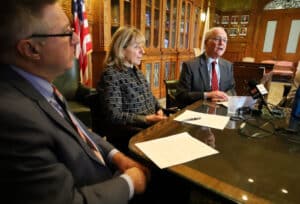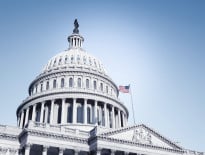
Senate President Karen Spilka, center, speaks to reporters alongisde Sens. Michael Barrett and Michael Rodrigues, right and left, in this Jan. 23, 2020 file photo. Photo by Sam Doran | State House News Service
The lead Senate architect of the law made warned the Baker administration Wednesday he will be watching its implementation of a landmark carbon emissions bill closely, particularly the creation of a new building code meant to rein in the commercial real estate industry’s contributions to climate change.
Sen. Michael Barrett spoke as part of the Northeast Clean Energy Council and Alliance for Business Leadership’s annual Massachusetts Clean Energy Day, an event that also featured his House counterpart Rep. Jeff Roy and Department of Energy Resources Commissioner Patrick Woodcock, and that illustrated the bifurcated state of climate policy right now: one eye on making the ambitious new law a reality and the other looking for a solution to the next challenge.
“I want to emphasize the Senate’s interest in following through with implementation of the 2021 climate act. The Senate as a body has a lot invested here,” Barrett said, adding that even though the law was a result of legislative and executive branch collaboration, “small gaps” remain between how the Senate would like to see the law implemented and the Baker administration’s perspective.
The law Gov. Charlie Baker signed in March after months of stops and starts commits Massachusetts to achieve net-zero carbon emissions by 2050, establishes interim emissions goals between now and the middle of the century, adopts energy efficiency standards for appliances, authorizes another 2,400 megawatts of offshore wind power and addresses needs in environmental justice communities.
Barrett has taken a watchdog role in the law’s implementation since the governor’s signature was still wet. Minutes after the bill signing, he told the News Service he was concerned that the Baker administration had tried to “evade legislative intent” of the new law. On Wednesday, he pointed specifically to the law’s provision calling for a municipal opt-in net-zero stretch energy code – which was a major point of contention between the legislature and governor during debate on the bill – as an area of concern. The code will eventually become the statewide standard for new buildings by the end of the decade.
“The framing, verbally, of the administration’s responsibility here by others in the administration has tended to drop the words ‘net-zero’ out of the conversation, which is really strange because we not only require in statute that there be a definition of net zero building, we also require that there be, and I’m quoting from the statute, ‘net-zero building performance standards’ promulgated by the end of 2022,” he said.
“So there’s still a difference between legislative intention, which is pretty clear, and what the administration says it intends to do with drafting the net-zero stretch energy code,” the senator added.
Barrett said the Senate would be “dead serious” about making sure “that the politics within the executive branch, which may include builders and developers, don’t somehow throw us off path.”
“I don’t think it’s going to happen, but I haven’t seen a significant indication really that there’s unambivalent buy-in by the executive at the current time, current company exempted,” he said.
Barrett excluded Department of Energy Resources Commissioner Patrick Woodcock from his criticisms throughout his remarks Wednesday. During his own remarks, Woodcock mentioned that DOER is “moving forward with building code updates, not only with our stretch code but looking at a municipal opt-in that includes a definition of net-zero.”
On Tuesday, Barrett and Senate Global Warming Committee Chair Sen. Cynthia Creem issued a five-page document outlining the numerous deadlines the executive branch will have to meet as it implements the climate law. The administration faces a June 25 deadline to add three new energy efficiency experts as members of the state Board of Building Regulations and Standards, which writes Massachusetts’ building codes.




 |
| 

